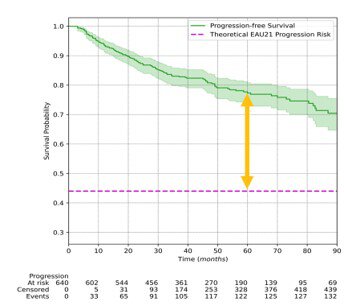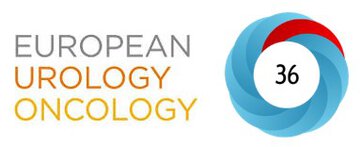Subiela JD,..., Gomez Dos Santos V, Jiménez MÁ, Burgos FJ. Unlocking the Potential of Adequate Bacillus Calmette-Guérin Immunotherapy in Very-high-risk Non-muscle-invasive Bladder Carcinoma: A Multicenter Analysis of Oncological Outcomes and Risk Dynamics
Eur Urol Oncol. 2024
“The patients with very high-risk NMIBC who receive adequate BCG therapy experience a more favorable prognosis than previously reported by the European Association of Urology risk groups” – Dr. José Daniel Subiela Henríquez
Summary:
Objective
To analyze oncological outcomes in VHR NMIBC patients (EAU risk groups) treated with adequate BCG.
A multi-institutional retrospective study involving patients with VHR NMIBC who received adequate BCG therapy from 2007 to 2020 was conducted.
Outcome measurements and statistical analysis
A survival analysis estimated recurrence-free survival (RFS), progression-free survival (PFS), and the cumulative incidence of cancer-specific mortality (CSM) after accounting for other causes of mortality as competing risk events and of the overall mortality (OM). Conditional survival probabilities for 0-4 yr without events were computed. Cox regression assessed the predictors of oncological outcomes.
Results and limitation
A total of 640 patients, with a median 47 (32-67) mo follow-up for event-free individuals, were analyzed. High-grade RFS and PFS at 5 yr were 53% (49-57%) and 78% (74-82%), respectively. The cumulative incidence of CSM and OM at 5 yr was 13% (10-16%) and 16% (13-19%), respectively. Conditional RFS, PFS, overall survival, and cancer-specific survival at 4 yr were 91%, 96%, 87%, and 94%, respectively. Cox regression identified tumor grade (hazard ratio [HR]: 1.54; 1.1-2) and size (HR: 1.3; 1.1-1.7) as RFS predictors. Tumor multiplicity predicted RFS (HR: 1.6; 1.3-2), PFS (HR: 2; 1.2-3.3), and CSM (HR: 2; 1.2-3.2), while age predicted OM (HR: 1.48; 1.1-2).
Why do you highlight this publication?
There is a role of BCG immunotherapy in this patient cohort, particularly for those who maintain sustained BCG response in the long-term. Besides, our study does not provide enough evidence to support BCG as the first-line therapy for all VHR patients. Therefore, it should be considered cautiously on a case-by-case basis. The prognosis of patients with VHR NMIBC improves over time. Thus, the probability of recurrence and progression is sufficiently low when patients remain disease-free for four years to justify less strict follow-up.
Publication commented by:
Dr. José Daniel Subiela Henríquez
Urology Department, Surgical research in urology and renal transplantation group.
IRYCIS, HURYC



